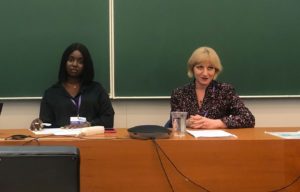An internet for resilience and inclusion: European Dialogue on Internet Governance 2023
28 June 2023
With a growing focus on how both to address problems in the online world, and find ways to realise its potential to support development, the 2023 European Dialogue on Internet Governance provided a great opportunity to highlight library contributions and values.

In particular in Europe, the last few years have seen major efforts to regulate the internet.
Driven by concern about the power and influence of major platforms, and concern that digital tools are creating or intensifying problems, there has been an intensification of laws, declarations and other tools trying to shape how the digital world works.
Fora like the European Dialogue for Internet Governance (EuroDIG) – the European leg of the Internet Governance Forum – offer a valuable opportunity to look at these issues holistically, rather just from any one specific perspective.
The 2023 edition of EuroDIG took place in Tampere Finland, with IFLA represented by Maia Simonishvili, member of IFLA’s Europe Regional Division Committee, and IFLA Headquarters.
Focusing on what matters
Already in the theme of the event – an internet for resilience and inclusion – the need to regulate the internet in ways that helps deliver on key policy goals was clear.
There was a particular focus on the war against Ukraine, and the issues that this raised about the internet and digital content. The need for strong infrastructures was clear, as was more work to combat misinformation and disinformation.
Other sessions looked at possibilities to build digital information literacy, minimise negative environmental impacts, and promote international cooperation.
Crucially, speakers stressed the need to take care, when regulating the impact, not to affect what made it so potentially powerful as a force for development. A series of sessions looked in particular at the risks of internet fragmentation, which could lead to reduced access to information and cross-border exchange.
Indispensable libraries
Across the issues discussed, the potential for libraries to contribute was clear, from connectivity itself to developing digital skills, and even helping users to become more active participants in internet governance discussions.
IFLA’s own side-event focused on how libraries could help counter the risk of a decoupling of progress in connectivity from progress in meaningful internet access. Maia Simonishvili and Nana Ama Yeboah Addo (IGF Youth Fellow) shared their ideas about what meaningful connectivity looked like, and how to get there.
The specific role of libraries in providing all three aspects of this – connectivity, content and competences – was clear, as was the need for a more holistic, multi-stakeholder approach to internet governance, rather than reactive efforts to deal with specific problems. Participants highlighted, in turn, how libraries could help communities as a whole make the most of the internet.
In 2023, libraries are strongly engaged in questions both around the application of technology and its impacts on individuals and society. They therefore represent a strong partner for governments and civil society in exploring the countermeasures to many of today’s challenges revolving around the use of the internet. If considered as an integral part of public policy development for meaningful Internet access, libraries have the potential to play a crucial role in this process.